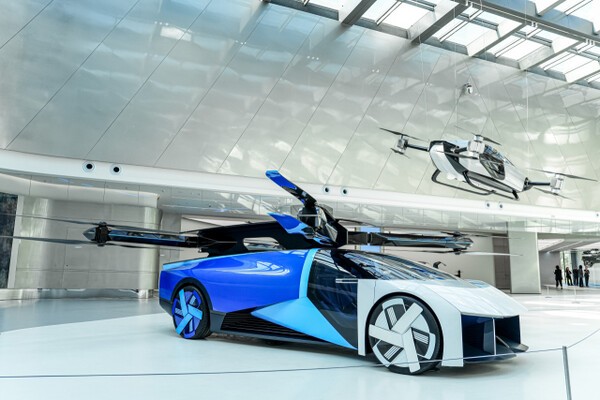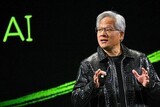China and the U.S. Begin Commercial Countdown
The “flying car,” or eVTOL (electric vertical takeoff and landing aircraft), is no longer a concept confined to science fiction.
China is already leading the world in both technology and commercialization. According to the Korea Institute for Advancement of Technology (KIAT), China filed 74 international eVTOL patents in 2024, surpassing the U.S. (68) and maintaining its position as the global leader for the second consecutive year.

At XPeng’s Guangzhou headquarters, the company’s latest flying car prototype is on display. XPeng has begun operating a factory capable of producing 10,000 flying cars annually and has already secured 5,000 orders. Its subsidiary Ehang, the first company in the world to receive certification for operating autonomous passenger drones, recently unveiled its new 200 km-range model “VT-35,” aiming to expand into intercity mobility.
In the U.S., Joby Aviation plans to launch the first air taxi service in Dubai early next year, with exclusive operation rights secured through 2030. The company is also in the process of obtaining service licenses in New York, Los Angeles, London, and Tokyo.
Korea’s UAM Test Projects Shrink — and Companies Pull Out
In contrast, South Korea remains stuck in the testing phase.
Only two consortiums (One Team and Dream Team) are currently participating in the “K-UAM Grand Challenge” Phase 2, led by the Ministry of Land, Infrastructure and Transport.
Seven teams took part in Phase 1, but major players such as SK Telecom, LG Uplus, GS E&C, and Kakao Mobility have since withdrawn — largely due to telecom companies shifting their investment focus toward AI rather than UAM.
As a result, Korea’s technology gap is widening. According to KIAT, Korea’s eVTOL technological capability stands at 74.7% of the U.S. level, lagging behind China (82.9%) and Japan (82.6%). As of 2024, Korea filed only 11 international patents in the sector, reflecting its limited global competitiveness.
“Time to Focus on Commercialization, Not Just Testing”
Experts warn that Korea must move beyond test demonstrations and build a concrete commercialization roadmap.
Government-led demonstrations alone are insufficient to nurture a sustainable industry ecosystem.
The U.S. allows private companies to lead under FAA certification frameworks, while China mobilizes large-scale national production and commercialization strategies to attract private investment.
Although Hyundai Motor Group’s Supernal continues its eVTOL development mainly in the U.S., it has not directly joined domestic test projects.
An industry insider stressed,
“To avoid falling behind in the global tech race, Korea needs comprehensive support that goes beyond R&D — including infrastructure, regulatory reform, and investment ecosystems.”
Future Mobility: The Real Takeoff Depends on Willpower
By 2030, China aims to produce 100,000 eVTOLs.
Korea, meanwhile, is still discussing test-flight approvals and airspace designations.
In the race for the skies, it is becoming clear that the deciding factor is not just technology — but the will to act, backed by government determination and timely legal frameworks.
Tech Insider Columnistㅣtlswnqor@naver.com
- The Era of Robot Parking: Kakao Mobility and Hyundai Wia Make It Real
- Xpeng to Launch Self-Developed AI-Chip Robotaxi Next Year: “Ahead of Tesla”
- Mercedes-Benz Comes to Seoul: Why LG’s ‘One LG’ Strategy Marks a New Era in Automotive Partnerships
- DeepSeek’s ‘Genius Developer’ Luo Fuli Chooses Xiaomi After All
- “XPENG Humanoid Walks So Naturally People Thought a Human Was Inside…” CEO Unzips Robot On Stage to Shut Down Rumors

![[동학] 카카오톡 친구탭, 결국 12월 롤백… “격자형 피드는 선택 옵션으로”](https://cdn.kmjournal.net/news/thumbnail/custom/20251126/5517_10550_1119_1763853080_120.jpg)


![[테크 칼럼] 제미나이3, GPT-5.1을 넘다…AI는 이제 ‘일을 대신하는 시대’로 간다](https://cdn.kmjournal.net/news/thumbnail/custom/20251126/5457_10454_4847_1763621329_120.jpg)



![[낭만 테크 시대] AI 대항해 시대](https://cdn.kmjournal.net/news/thumbnail/custom/20251126/5603_10714_4334_1764121414_160.jpg)

